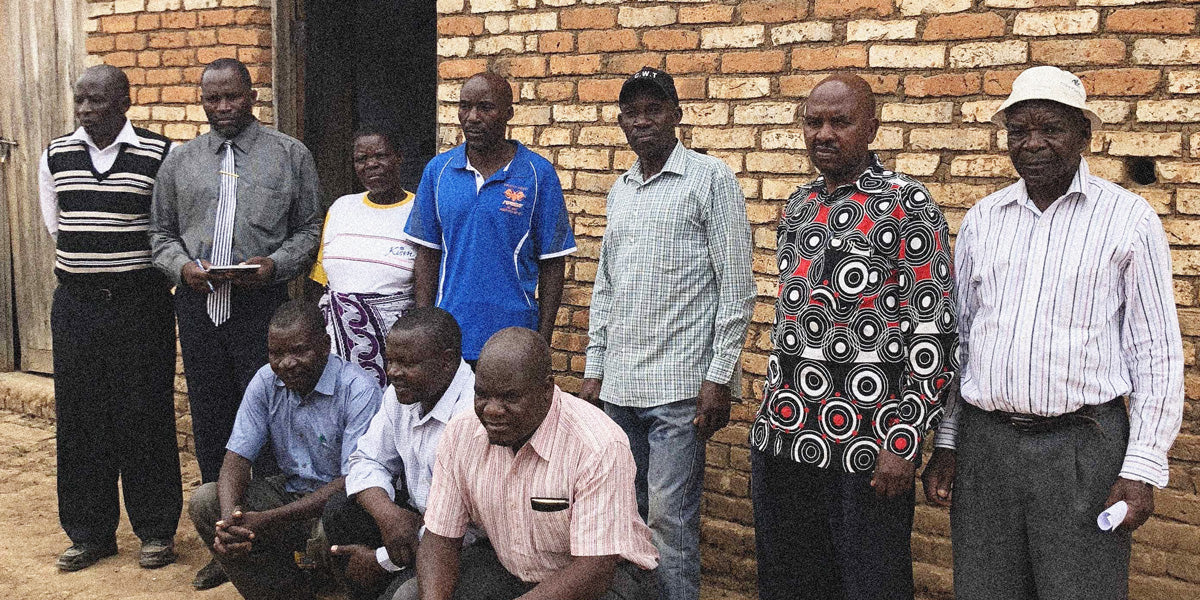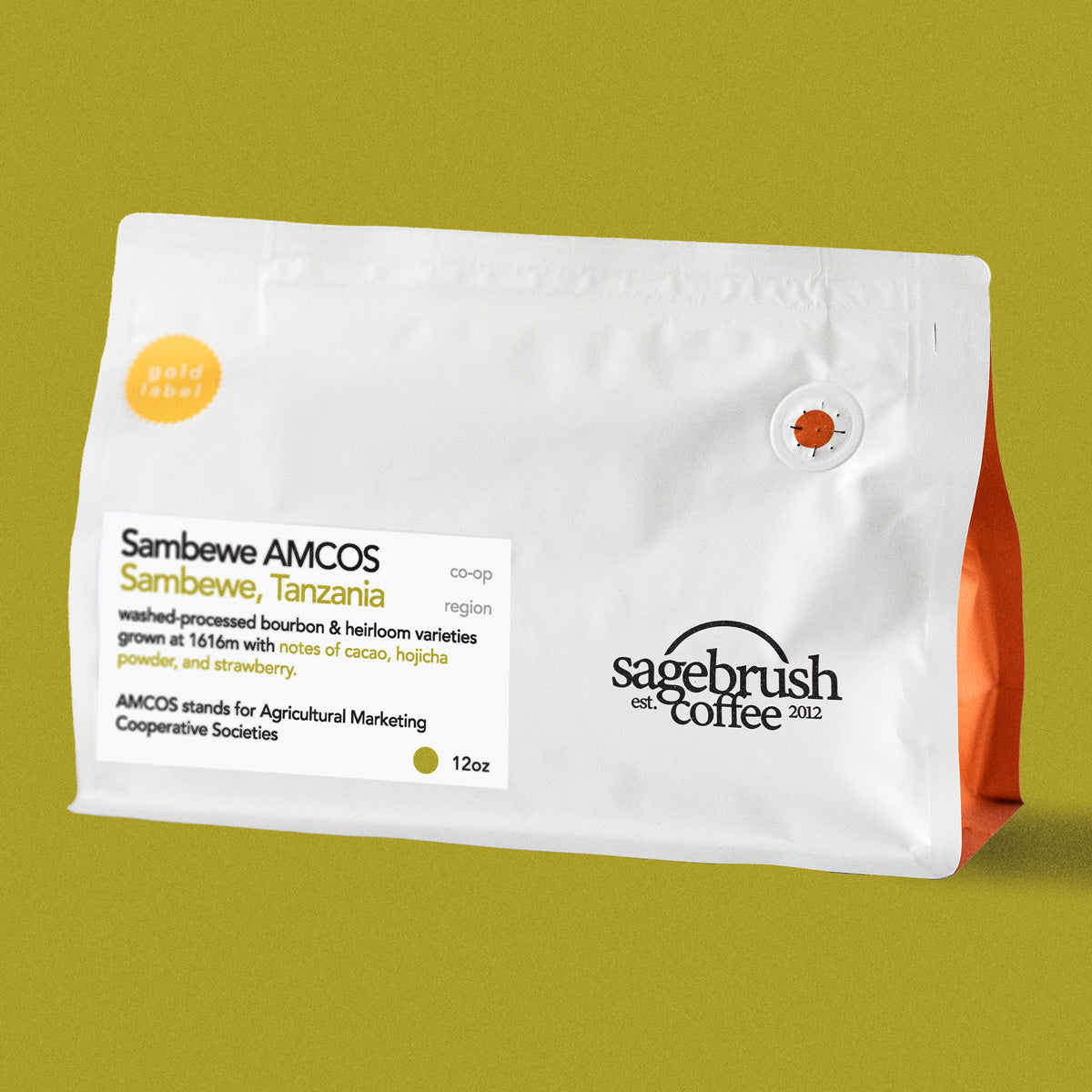Producer Profiles Main Page •
Back to Producers OverviewWe've been lucky to build relationships with coffee producers around the world, but there's something special about the way people come together in Tanzania.
Sambewe AMCOS is one of those places where you can see what's possible when farmers decide their future is stronger together. We've started buying from them using our great partnership with Cafe Imports, a certified B-Corp, and we're glad to share their story.
A Union of Villages
Sambewe AMCOS represents more than 440 smallholder farmers who live in and around five villages in the Mbozi district of Tanzania: Sambewe, Itumpi, Nansama, Iyenga, and Ileya. This cooperative is the result of four local farmers groups deciding in 2018 that they could accomplish more by combining forces. That decision has shaped everything about how they work today.
The Mbozi district sits in Tanzania's Southern Highlands, in the Songwe region near the borders with Zambia and Malawi. It's a landscape of narrow valleys surrounded by high mountains, with fertile volcanic soil and favorable rainfall that makes it one of Tanzania's key coffee-producing areas. The region's elevation, typically between 1,600 and 1,800 meters above sea level, allows coffee cherries to develop slowly and build complexity.
AMCOS stands for Agricultural Marketing Cooperative Society, and it's the most common cooperative structure in Tanzania. These organizations coordinate processing, transportation, and marketing for their members by providing centralized facilities. In Tanzania, about 95% of coffee production flows through AMCOS, which means smallholder farmers, many with plots between half a hectare and two hectares, have a way to access the global market.
How They Work
All of the farmers in Sambewe AMCOS deliver their coffee in cherry form to a shared Central Processing Unit, or CPU. This centralized approach means quality control happens at the facility level, where trained staff can monitor every step of processing. The cherries from different farms are blended together and sorted before being separated by quality, with the highest-scoring lots becoming microlots that can fetch premium prices.
The typical process starts when farmers deliver their hand-picked cherries to the CPU. The coffee is pulped, fermented in tanks, washed in water channels where beans are further classified by density, and then dried on raised beds for seven to ten days. During drying, workers continuously turn the beans and cover them with cloths during the hottest hours and at night to protect them from extreme temperature swings.
This shared infrastructure is what makes specialty coffee possible for smallholder farmers who couldn't afford their own processing equipment. It also means knowledge spreads quickly. When one farmer learns a better picking technique or discovers an issue with pests, that information benefits everyone.
Their Goals
Sambewe AMCOS has three clear priorities for the future. First, they want to build a new central processing unit. As the cooperative has grown, the existing facility has reached capacity, and a new CPU would allow them to handle more volume while maintaining quality.
Second, they're looking to renovate their office building and warehouse. These aren't just administrative spaces, they're where farmers gather, where decisions get made, and where coffee sits before it ships. Better infrastructure means better storage conditions and a more professional operation.
Third, and perhaps most telling about their values, they want to plant local trees to create shade and biodiversity. This isn't about maximizing short-term production. It's about building an ecosystem that will support coffee farming for decades, providing habitat for birds and beneficial insects, enriching the soil, and protecting against erosion.
The Bigger Picture
Tanzania's Southern Highlands harvest typically runs from May through September, with coffee trees blooming between September and October. The region grows primarily Bourbon derivatives, which are well-adapted to the elevation and soil conditions.
What sets the Southern Highlands apart from Tanzania's northern coffee regions is both the landscape and the production model. While larger estates dominate the north, the south is primarily smallholder country. Farmers often grow coffee alongside maize, beans, peanuts, sunflower, or ginger, diversifying their income and using their land efficiently.
Recent years have brought encouraging developments across the region. Some AMCOS have partnered with organizations to establish coffee clubs at local high schools, where students learn about quality coffee production and receive seedlings to grow at home. It's a long-game approach to keeping young people engaged in coffee farming, which is essential for the industry's future.
Working Together
The relationship we've built with Sambewe AMCOS comes through Cafe Imports, which has been working in Tanzania for years to identify the best coffees from the region. Their Africa team, led by buyers who have lived and worked in Tanzania, understands the challenges and opportunities these cooperatives face.
Cafe Imports earned B-Corp certification in 2023, which means they've been independently evaluated on how they treat workers, community, environment, and customers. That alignment with our own values, combined with their deep relationships in Tanzania, makes them the right partner for this work.
Why This Matters
Coffee from Sambewe AMCOS represents something bigger than any single farm could achieve. It's about 440 farm families who've chosen cooperation over competition, who've invested in shared infrastructure, and who are thinking about the long-term health of their land and community.
When we buy from Sambewe AMCOS, we're supporting that choice. We're helping fund the renovations and new facilities they need. We're recognizing the care they take in processing. And we're participating in a supply chain that treats smallholder farmers as partners, not just suppliers.
That's the kind of coffee relationship we want to be part of, one built on respect, transparency, and a shared commitment to quality that benefits everyone involved.





